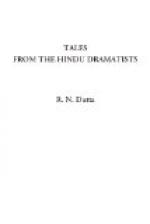Before returning to Ayodhya, Rama is induced to visit the hermitage of the sage Agastya in Panchavati. Sita now reappears. She is herself invisible to Rama through the favour of the Bhagirathi but able to thrill with emotions by her touch. Rama is greatly distracted.
He faints with old remembrances but revives on the touch of Sita. He observes, “What does this mean? Heavenly balm seems poured into my heart; a well-known touch changes my insensibility to life. Is it Sita, or am I dreaming?”
He vainly seeks for her possession, but at last goes away on the advice of his companion Visanti.
The sage Valmiki makes great preparations for receiving Vasishtha, Janaka, Kaushalya, the mother of Rama and other eminent guests. The pupils are delighted because the visit of the guests affords hopes of a feast at which flesh meat is to constitute one of the dishes.
As the boys have got a holiday in honour of the guests, they are playing at some distance from a tree outside the hermitage. Among them, Kaushalya notices a boy with the features of her son, who is called in but whom the guests do not yet know to be a son of Rama.
Soon after, the horse of the horse-sacrifice of Rama comes near and he goes out with other boys to see the fun while the elders go to see the host.
The attendant soldiers cry out that Rama is the only hero of the world. Lava—for such is the boy’s name,—cannot brook such vaunts and removes the banner. Soldiers crowd upon him and Lava draws his bow. Lakshmana’s son Chandraketu—the general of the army—arrives surprised at the slaughter of his army and asks Lava to leave the incapable army and fight with himself. Lava obeys the call and after some conversation in which he ridicules the powers of Rama and infuriates his antagonist, they go out to fight.
The discharge and repulsion of the divine weapons occur.
The approach of Rama puts an end to the contest. Lava’s elder brother Kusa has heard of his fight and comes to “eradicate from the world the name of emperor.” But Lava has become calm and asks his brother to pay respects to the hero of the Ramayana.
Rama embraces both of them and is moved with their son-like touch. He notices in them the features of his wife He knows that his children alone could possess the divine weapons. He recollects that his wife was left in that part of the forest and instinctively comes to the conclusion that they are his children. He wishes to ask about their birth in a roundabout way, but before proceeding to the end, is asked to see his spiritual preceptor.
The desertion of Sita is acted by nymphs on the banks of the Ganges before Rama and other high guests invited by Valmiki.
Sita, from behind the stage, cries out “the beasts of prey desire [to devour] me in the forest (left) alone and unprotected. I will throw myself into the Bhagirathi.” She enters supported by her mother Prithivi, the Earth and Ganga, each carrying a baby in the lap. Ganga tells her of the birth of the twins and consoles her, but Earth is greatly distressed with the conduct of Rama. Ganga replies “who can close the door of Fate?”




